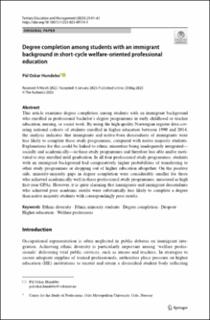Degree completion among students with an immigrant background in short-cycle welfare-oriented professional education
Peer reviewed, Journal article
Published version
Permanent lenke
https://hdl.handle.net/11250/3116374Utgivelsesdato
2023Metadata
Vis full innførselSamlinger
- Publikasjoner fra Cristin [3269]
- SPS - Documents [424]
Sammendrag
This article examines degree completion among students with an immigrant background who enrolled in professional bachelor’s degree programmes in early childhood or teacher education, nursing, or social work. By using the high-quality Norwegian register data covering national cohorts of students enrolled in higher education between 1990 and 2014, the analysis indicates that immigrants and native-born descendants of immigrants were less likely to complete these study programmes, compared with native majority students. Explanations for this could be linked to ethnic minorities being inadequately integrated—socially and academically—in these study programmes and therefore less able and/or motivated to stay enrolled until graduation. In all four professional study programmes, students with an immigrant background had comparatively higher probabilities of transferring to other study programmes or dropping out of higher education altogether. On the positive side, minority-majority gaps in degree completion were considerably smaller for those who achieved academically well in these professional study programmes, measured as high first-year GPAs. However, it is quite alarming that immigrants and immigrant descendants who achieved poor academic results were substantially less likely to complete a degree than native majority students with correspondingly poor results.

